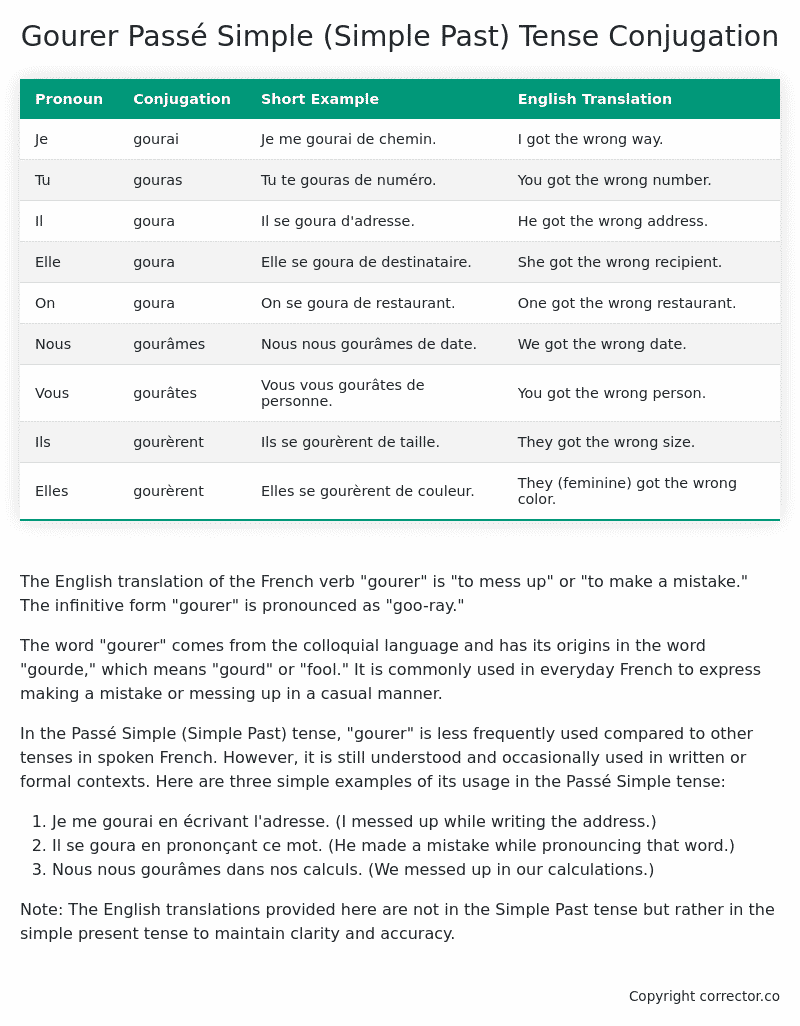Passé Simple (Simple Past) Tense Conjugation of the French Verb gourer
Introduction to the verb gourer
The English translation of the French verb “gourer” is “to mess up” or “to make a mistake.” The infinitive form “gourer” is pronounced as “goo-ray.”
The word “gourer” comes from the colloquial language and has its origins in the word “gourde,” which means “gourd” or “fool.” It is commonly used in everyday French to express making a mistake or messing up in a casual manner.
In the Passé Simple (Simple Past) tense, “gourer” is less frequently used compared to other tenses in spoken French. However, it is still understood and occasionally used in written or formal contexts. Here are three simple examples of its usage in the Passé Simple tense:
- Je me gourai en écrivant l’adresse. (I messed up while writing the address.)
- Il se goura en prononçant ce mot. (He made a mistake while pronouncing that word.)
- Nous nous gourâmes dans nos calculs. (We messed up in our calculations.)
Note: The English translations provided here are not in the Simple Past tense but rather in the simple present tense to maintain clarity and accuracy.
Table of the Passé Simple (Simple Past) Tense Conjugation of gourer
| Pronoun | Conjugation | Short Example | English Translation |
|---|---|---|---|
| Je | gourai | Je me gourai de chemin. | I got the wrong way. |
| Tu | gouras | Tu te gouras de numéro. | You got the wrong number. |
| Il | goura | Il se goura d’adresse. | He got the wrong address. |
| Elle | goura | Elle se goura de destinataire. | She got the wrong recipient. |
| On | goura | On se goura de restaurant. | One got the wrong restaurant. |
| Nous | gourâmes | Nous nous gourâmes de date. | We got the wrong date. |
| Vous | gourâtes | Vous vous gourâtes de personne. | You got the wrong person. |
| Ils | gourèrent | Ils se gourèrent de taille. | They got the wrong size. |
| Elles | gourèrent | Elles se gourèrent de couleur. | They (feminine) got the wrong color. |
Other Conjugations for Gourer.
Le Present (Present Tense) Conjugation of the French Verb gourer
Imparfait (Imperfect) Tense Conjugation of the French Verb gourer
Passé Simple (Simple Past) Tense Conjugation of the French Verb gourer (You’re reading it right now!)
Passé Composé (Present Perfect) Tense Conjugation of the French Verb gourer
Futur Simple (Simple Future) Tense Conjugation of the French Verb gourer
Futur Proche (Near Future) Tense Conjugation of the French Verb gourer
Plus-que-parfait (Pluperfect) Tense Conjugation of the French Verb gourer
Passé Antérieur (Past Anterior) Tense Conjugation of the French Verb gourer
Futur Antérieur (Future Anterior) Tense Conjugation of the French Verb gourer
Subjonctif Présent (Subjunctive Present) Tense Conjugation of the French Verb gourer
Subjonctif Passé (Subjunctive Past) Tense Conjugation of the French Verb gourer
Subjonctif Imparfait (Subjunctive Imperfect) Tense Conjugation of the French Verb gourer
Subjonctif Plus-que-parfait (Subjunctive Pluperfect) Tense Conjugation of the French Verb gourer
Conditionnel Présent (Conditional Present) Tense Conjugation of the French Verb gourer
Conditionnel Passé (Conditional Past) Tense Conjugation of the French Verb gourer
Conditionnel Passé II (Conditional Past II) Tense Conjugation of the French Verb gourer
L’impératif Présent (Imperative Present) Tense Conjugation of the French Verb gourer
L’impératif Passé (Imperative Past) Tense Conjugation of the French Verb gourer
L’infinitif Présent (Infinitive Present) Tense Conjugation of the French Verb gourer
L’infinitif Passé (Infinitive Past) Tense Conjugation of the French Verb gourer
Le Participe Présent (Present Participle) Tense Conjugation of the French Verb gourer
Le Participe Passé (Past Participle) Tense Conjugation of the French Verb gourer
Struggling with French verbs or the language in general? Why not use our free French Grammar Checker – no registration required!
Get a FREE Download Study Sheet of this Conjugation 🔥
Simply right click the image below, click “save image” and get your free reference for the gourer Passé Simple tense conjugation!

Gourer – About the French Passé Simple (Simple Past) Tense
Formation
Usage
Narration
Historical Context
Interactions with other tenses
Passé Composé
Imparfait
Conditional and Subjunctive
Summary
I hope you enjoyed this article on the verb gourer. Still in a learning mood? Check out another TOTALLY random French verb conjugation!


